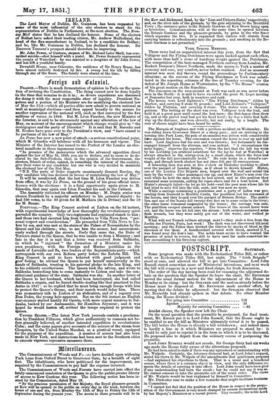,fortign nub Colonial.
FnAncz.—There is much fermentation of opinion in Paris on the ques- tion of revising the Constitution. The thing cannot now be done legally in the time that remains to do it in ; so divers expedients are discussed for doing it with the most respectable show of legality. President Na- poleon and a portion of his Ministry are for modifying the electoral law of May the 31st—which all parties alike now admit to govern national as well as municipal elections—and than appeal broadly to the masses for another expression of the national will, such as that conveyed by the five millions of voices in 1848. But M. Leon Faucher, the new Minister of the Interior, is said to be strenuously against any alteration of the law of May, on account of the encouragement which change would give to " the demagogues and the party of Disorder." It is said that M. Baroohe and M. Rouher have gone over to the President's view, and "have ceased to be partisans of the law of May." La Prase has now a new point of attack—a serious constitutional point, which M. Girardin will belabour with all his keenness and vigour. The Minister of the Interior has issued to the Prefect of the Landes an elec- toral manifesto in these ingenuous terms-
" In presence of the manoeuvres which the advanced opposition direct against the law of May 31, 1850, you are to declare, and to cause to be de- clared by the Sub-Prefects, that, in the opinion of the Government, the electors, friends of order, cannot, in consulting the interest of the country, give their votes to any candidate but one who is very decided to maintain the electoral law of the 31st May. "N.B. The party of Order supports unanimously General Damien, the only candidate who has declared in favour of maintaining the law of May." It will be recollected, that the last time M. Leon Faucher was driven from office, it was by La Prase, on the ground of his gross official inter- ference with the elections : it is a fatal opportunity again given to M. Girardin, that may again cost Leon Faucher his seat in the Cabinet. The Assembly reelected its officers on Monday: M. Dupin senior was chosen President by a majority satisfactory to his personal dignity : he had 350 votes, to the 85 given for M. Mathieu (de la DrOme) and the 19 for M. Bonne.
PORTUGAL.—The King Consort arrived at Lisbon on the 3d instant, with experimental knowledge of how thoroughly the revolutionary spirit pervaded the country. Only two regiments had continued stanch to him ; and those two had escorted him from Coimbra to Villa Nova from "per- sonal respect and consideration." He proceeded from Villa Nova to Lis- bon by sea, and was met at the stairs of the Palace of Neeessidades by the Queen and his children ; who, to see him the sooner, had unceremoni- ously walked through the streets. Early that same day, the Duke of Terceira stated to the Queen, that he was unable to form a Ministry ; and late in the day it is said that a letter was received from Saldanha, in which he " enjoined " the formation of a Ministry under his own presidency, with the Foreign and Marine portfolios in the hands of Lavradio and Sa, two leaders of the Septembrista party—which corresponds with our own Reform party before the Reform Bill. The sing Consort is said to have behaved with good judgment and Root! feeling : he advised the Queen to put herself unreservedly in the hands of Saldanha, trusting to his paternal pledge to the late King, and to his soldierly cavalheirisma. The Queen took the advice, and wrote to Saldanha beseeching him to come instantly to Lisbon and take the con- stitutional guidance of the state. Saldanha was shy. In another letter of the Queen to her husband, which had been intercepted, she had called Saldanha a coquin, and he feared double-dealing like that practised to Das Antes in 1847: so he replied that he must bring enough troops with him to protect the Queen's throne, and their march would delay him. There was momentary talk in Lisbon of an abdication, and of a regency over Don Pedro, the young heir-apparent. But on the 9th instant an English war-steamer started hastily for Oporto, with more urgent missives to Sal- danha, backed by our Ambassador, Sir Hamilton Seymour; and it was hoped he would hasten off, without the troops required to protect the Queen.
Usirriso ft:Am.—The latest New Yorkjournals contain a proclama- tion by President Fillmore, which gives authenticity to rumours not be- fore generally believed, of another intended expedition to revolutionize Cuba ; and the same papers give accounts of the seizure of the steam-boat Cleopatra, by the United States Marshal, as a piratical vessel, equipped for the purposes of the expedition. A number of arrests had also been made in New York, and instructions had been sent to the Southern cities to execute vigorous repressive measures there.


























 Previous page
Previous page